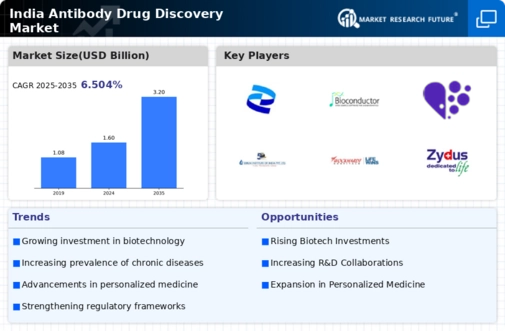Increasing Demand for Targeted Therapies
The antibody drug-discovery market in India is experiencing a notable surge in demand for targeted therapies. This trend is driven by the growing prevalence of chronic diseases such as cancer and autoimmune disorders, which require more precise treatment options. As healthcare providers and patients alike seek therapies that minimize side effects while maximizing efficacy, the market is likely to expand. According to recent estimates, the market for targeted therapies is projected to grow at a CAGR of approximately 15% over the next five years. This increasing demand is prompting pharmaceutical companies to invest heavily in antibody drug-discovery, thereby enhancing the overall landscape of the industry.
Rising Awareness of Personalized Medicine
There is a growing awareness of personalized medicine among healthcare professionals and patients in India, which is positively impacting the antibody drug-discovery market. Personalized medicine aims to tailor treatments based on individual genetic profiles, thereby improving therapeutic outcomes. This shift towards personalized approaches is driving the demand for monoclonal antibodies and other targeted therapies that can be customized for specific patient populations. As healthcare systems increasingly adopt personalized treatment protocols, the antibody drug-discovery market is expected to expand. This trend suggests a promising future for the industry, as it aligns with the global movement towards more individualized healthcare solutions.
Government Support and Funding Initiatives
The Indian government is increasingly recognizing the importance of the antibody drug-discovery market and is providing substantial support through funding initiatives and policy frameworks. Programs aimed at promoting biotechnology and pharmaceuticals are being implemented, which include grants and subsidies for research and development. This governmental backing is crucial for fostering innovation and attracting investments in the sector. For instance, the Biotechnology Industry Research Assistance Council (BIRAC) has been instrumental in facilitating funding for various biotech projects. Such initiatives are likely to enhance the capabilities of Indian firms in the antibody drug-discovery market, positioning them favorably on the international stage.
Advancements in Biotechnological Techniques
Technological advancements in biotechnology are significantly influencing the antibody drug-discovery market in India. Innovations such as CRISPR gene editing, high-throughput screening, and next-generation sequencing are streamlining the discovery process, making it faster and more efficient. These technologies enable researchers to identify and develop antibodies with higher specificity and affinity for their targets. As a result, the efficiency of drug development is improving, which could potentially reduce costs and time-to-market. The integration of these advanced techniques is expected to bolster the competitive edge of Indian firms in the antibody drug-discovery market, fostering a more robust industry.
Growing Collaboration Between Academia and Industry
Collaboration between academic institutions and the pharmaceutical industry is becoming increasingly prevalent in the antibody drug-discovery market in India. This synergy is fostering innovation and accelerating the translation of research findings into viable therapeutic products. Universities and research institutes are partnering with biotech firms to leverage their expertise in antibody engineering and development. Such collaborations not only enhance the research capabilities but also provide access to funding and resources. As a result, the antibody drug-discovery market is likely to benefit from a more dynamic and innovative research environment, which could lead to the development of novel therapies.
















